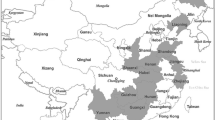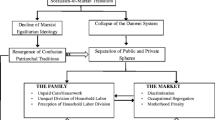Abstract
The value of children has emerged as an important lens in understanding social changes and individual decision-making concerning childbearing and childrearing. The current study illustrates the usefulness of this lens in the context of contemporary Vietnam, based on a national representative survey dataset. We develop a theoretical framework incorporating three sets of structural factors (cohort, South or North, family SES) plus demographic factors to understand the valuation of children and its fertility implications. We reveal the following findings. First, we document a generally higher emotional value than instrumental value among Vietnamese respondents across cohorts. Moreover, the post-reform birth cohort reports both lower emotional and lower instrumental value of children; and the Southern sample on average holds higher emotional and higher instrumental values of children than the Northern sample. Second, in regression analysis, the emotional value of children shows little variation and the proposed factors explain a lower proportion of its variation, but we capture a strong cohort effect, regional divide and social class effect on the instrumental value of children. Last, while there exists a negative association between emotional valuation of children and respondents’ fertility, and a positive association between instrumental valuation of children and respondents’ fertility, such effects have been reduced to non-significant levels once independent variables (birth cohort, region, and family SES) are controlled. This study challenges and complicates the dominant discourse in existing literature on the rise of the “emotionally valuable” and “economically and instrumentally useless” child in modern societies. We instead reveal that respondents’ value orientations and their impact on fertility trends should be contextualized in Vietnam’s historical and political trajectory of ‘complex modernization’.



Similar content being viewed by others
References
Arnold, F., Bulatao, R. A., Buripakdi, C., Chung, B. J., Fawcett, J. T., Iritani, T., et al. (1975). The value of children: A cross-national study. Honolulu: East-West Center.
Beck, U. (1992). Risk Society: Towards a New Modernity: Sage publication.
Becker, G. S. (1960). An economic analysis of fertility. In Demographic and economic change in developed countries (pp. 209-240): Columbia University press.
Becker, G. S., & Barro, R. J. (1988). A reformulation of the economic theory of fertility. The Quarterly Journal of Economics, 103(1), 1–25.
Bulatao, R. A. (1984). Reducing fertility in developing countries. A review of determinants and policy levers. World Bank staff working papers 680. Washington, D.C.: International Bank for Reconstruction and Development.
Caldwell, J. C. (1976). Toward a restatement of demographic transition theory. Population and Development Review, 2(3–4), 321–366.
Chang, K.-S. (2010). Individualization without individualism: Compressed modernity and obfuscated family crisis in East Asia. Journal of Intimate and Public Spheres. Asian and Global Forum. Kyoto University Global COE Program., Pilot Issue.
Coale, A.J (1973). The demographic transition. In International Union for the Scientific Study of Population (IUSSP) Proceedings,, Liège, Belgium, (Vol. 1, pp. 53–71.)
Dang, N. A. (2019). Social security policies for Vietnamese families in modernization and international integration. In Government research program on families in modernization, industrilization and international intergration. Ha Noi: Ministry of Science and Technology and Vietnam Academy of Social Sciences.
Doan, K. T. (2017). Attitude and desire for having a child: A case study in ha Noi. Vietnam Journal of Family and Gender Studies, 27(5), 70–81.
Easterlin, R. A. (1983). Modernization and fertility: A critical essay. In R. A. Bulatao & R. D. Lee (Eds.), Determinants of fertility in developing countries (Vol. II, pp. 562–586). New York: Academic Press.
Goldscheider, Calvin (1971). Population, modernization, and social structure. Little Brown; Boston: 1971.
GSO. (2018). Report on labor force survey in quarter III, 2018. Ha Noi: General Statistics Office of Vietnam.
GSO. (2019a). The result of the 2019 Viet Nam population and housing cencus of 0:00 hours on 1 April 2019. Central Census Steering Committee: Ha Noi.
GSO. (2019b). Statistical yearbook of Vietnam 2019. Ha Noi: General Statistics Office of Vietnam.
Gu, X. (2020). Parenting for success: The value of children and intensive parenting in post-reform China. Child Indicators Research. https://doi.org/10.1007/s12187-12020-09746-12184.
Hirschman, C., & Nguyen, H. M. (2002). Tradition and change in Vietnamese family structure in the red River Delta. Journal of Marriage and Family, 64(4), 1063–1079.
Hoffman, L. W., & Hoffman, M. L. (1973). The value of children to parents. In P. p. o. population (Ed.), Fawcettm J. T. (pp. 19–76). New York: Basic Books.
Hollander, D. (1996). Son preference remains strong among Vietnamese women, but has only a modest effect on fertility. International Family Planning Perspective, 22, 84–84.
Inglehart, R., & Baker, W. (2000). Modernization, cultural change, and the persistance of traditional values. American Sociological Review, 65, 19–51.
Inglehart, R., & Welzel, C. (2009). How development leads to democracy: What we know about modernisation. Foreign Affairs, 88(2), 33–48.
Kagitcibasi, C. (1982a). The changing value of children in Turkey. Honolulu: East-West-Center.
Kagitcibasi, C. (1982b). Old-age security value of children. Cross-national socioeconomic evidence. Journal of Cross-Cultural Psychology, 13(1), 29–42.
Kagitcibasi, C., & Atace, B. (2005). Value of children, family change, and implications for the Care of the Elderly. Cross-Cultural Research, 49(4), 374–392.
Kidd, S., Gelders, B., & Tran, A. (2019). Potential impacts of social pensions in Viet Nam. Ha Noi: ILO.
Le, N. V. (2012). Family and family changes in Vietnam ha Noi: Social sciences publishing house.
MOLISA. (2019). Annual statistics 2000–2013. Ha Noi: Vietnam Ministry of Labour, Invalids and Social Affairs.
Nauck, B. (2014). Value of children and the social production of welfare. Demographic Research, 30, 1793–1824.
Nauck, B., & Klaus, D. (2007). The varying value of children: Empirical results from eleven societies in Asia, Africa and Europe. Current Sociology, 55(4), 487–503.
Ngo, T. T. D. (2012). The report of the ministerial-level scientific project: Values of children in moder family in Vietnam: Emerging issues. Vietnam Academy of Social Sciences: Institute for Family and Gender Studies.
Nguyen, C. T. (2019a). Economic function of modern families. In Government research program on families in modernization, industrilization and international intergration. Ha Noi: Ministry of Science and Technology and Vietnam Academy of Social Sciences.
Nguyen, H. M. (2009). Vietnamese marriage patterns in the red River Delta: Tradition and change. Ha Noi: Social Sciences Publishing House.
Nguyen, H. M. (2019b). Main characteristics of marriage in contemporary Vietnam and impact factors. In Government research program on families in modernization, industrilization and international intergration. Ha Noi: Ministry of Science and Technology and Vietnam Academy of Social Sciences.
Nguyen, L. P. (1995). Evaluation on the transition of child value after ten year in a commune Vietnam Journal of Sociology(2), 45–50.
Ochiai, E. (2010). Reconstruction of intimate and public sphere in Asia modernity: Familialism and beyond. Journal of Intimate and Public Spheres., Asian and global forum, Kyoto University global COE program. Pilot Issue, March.
Ong, Nhu Ngoc. 2004. “Support for democracy among generations”. Center for the study of democracy. University of California.
Schultz, T. (1973). The value of children: An economic perspective. Journal of Political Economy, 81(2), S2_13.
Shang, X., & Wu, X. (2011). The care regime in China: Elder and child care. Journal of Comparative Social Welfare, 27(2), 123–131.
Suzuki, T. (2013). Low fertility and population aging in Japan and eastern Asia. In Low fertility and population aging in Japan and Eastern Asia. SpringerBriefs in Population Studies. Springer, Tokyo. https://doi.org/10.1007/978-4-431-54780-8_1.
Tran, D. H. (1991). Traditional family in Vietnam under the impacts of Confucianism. In Liljestrom, & Tuong Lai (Eds.), Sociological research studies on family in Vietnam (pp. 25-46). Hà Nội: Social sciences publishing house.
Tran, T. M. T. (2007). Social determinants of age at first birth in Vietnam. Vietnam Journal of Family and Gender Studies, 2(4).
Tran, T. M. T. (2015). Divorce prevalence under the forces of individualism and collectivism in ‘shortcut’ modernity in Vietnam. In A. Kato (Ed.), Weaving women's spheres in Vietnam: The agency of women in family, religion and community. The Netherlands: Brill Publishers Asian Studies.
Tran, T. M. T. (2016). Life arrangement and care provision of left-behind elderly in Vietnam (case studies in two communes in Quang Ngai and Ha Tinh provinces). Vietnam Journal of Social Sciences, 175(5).
Tran, T. M. T. (2019a). Family values in contemporary Vietnam. In Government research program on families in modernization, industrilization and international intergration. Ha Noi: Ministry of Science and Technology and Vietnam Academy of Social Sciences.
Tran, T. M. T. (2019b). Institutional and cultural perspectives in elder care in rural Vietnam. Wieś i Rolnictwo (Culture and Village), 194(3), 11–30.
Tran, T. M. T. (2020). Divorce in southwest: Situation, socio-structural causes and consequences. General report. (project code: 504.05-2016.04). NAFOSTED. Ongoing.
Trinh, D. L., & Tran, T. M. T. (2017). Elder care in transitional Vietnam: Institutional and structural perspectives. Ha Noi: Social Sciences Publishing House.
Trommsdorff, G., & Nauck, B. (2005). The value of children in cross-cultural perspective: Case studies from eight societies. Lengerich: Pabst Science.
Trommsdorff, G., & Nauck, B. (2010). Introduction to special section for journal of cross-cultural psychology: Value of children: A concept for better understanding cross-cultural variations in fertility behavior and intergenerational relationships. Journal of Cross-Cultural Psychology, 41(5–6), 637–651.
UN Women (2016). Towards gender equality in Viet Nam: Making inclusive growth work for women. Ha Noi.
Vietnam Social Insurance (2018). Paper presented at the Preliminary review of 5 yars of implementaing Resolution No. 21-NQ/TW on strengthening the Party's leadership in social insurance and health insurance, Ha Noi, 28th June 2018.
Vu, T. H. (2014). Changes in family structure and poverty issues in the red River Delta. In H. M. Nguyen (Ed.), Vietnamese family in the industrialisation, modernisation and international integration from the comparative approach (pp. 389–416). Ha Noi: Social Sciences Publishing House.
Yeung, W.-J. J., Desai, S., & Jones, G. W. (2018). Families in southeast and South Asia. Annual Review of Sociology, 44, 469–495.
Yi, C. C., & Chen, Y. H. (2014). The intergenerational transmission of the value of children in contemporary Chinese families: Taiwan and mainland China compared. Comparative Population Studies, 39(4), 679–706.
Acknowledgements
This work is supported by Vietnam Ministry of Science and Technology and Vietnam Academy of Social Sciences in the study on “Family Values in Contemporary Vietnam”, code KHXH-GĐ/16-19/10; and the National Foundation for Science and Technology Development (NAFOSTED) in the study on “Divorce in the Southwest: situation, socio-structural causes and consequences”, code 504.05-2016.04. These two studies are led by Assoc. Prof. Tran Thi Minh Thi, the first author.
Author information
Authors and Affiliations
Corresponding author
Additional information
Publisher’s Note
Springer Nature remains neutral with regard to jurisdictional claims in published maps and institutional affiliations.
Appendix
Appendix
Rights and permissions
About this article
Cite this article
Thi, T.T.M., Xiaorong, G. & Dong, N.H. Complex Modernization: The Value of Children and Social Transformation in Contemporary Vietnam. Child Ind Res 14, 511–536 (2021). https://doi.org/10.1007/s12187-020-09791-z
Accepted:
Published:
Issue Date:
DOI: https://doi.org/10.1007/s12187-020-09791-z




